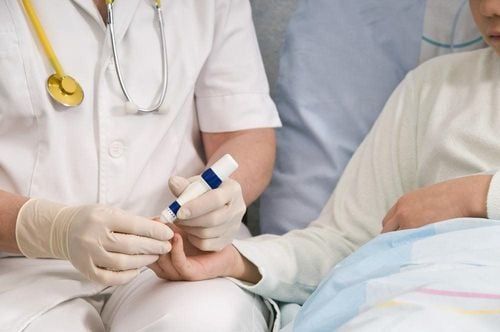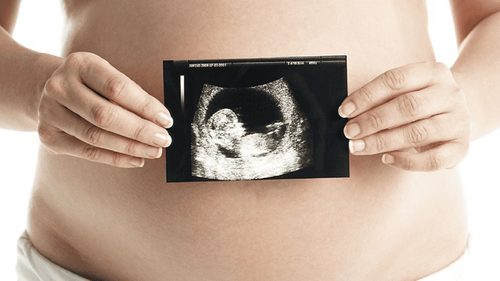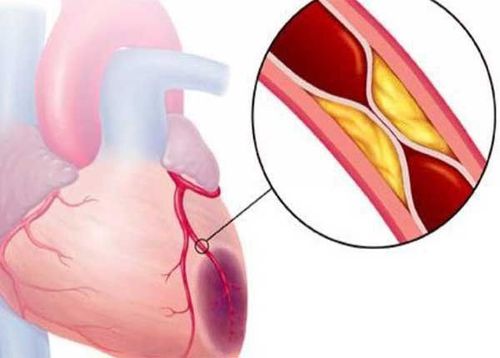This is an automatically translated article.
Gestational diabetes is a common condition that many pregnant women experience from the 20th week of pregnancy onwards. Gestational diabetes if not controlled in time can lead to negative effects on the health of both mother and baby.1. What is gestational diabetes?
Gestational diabetes is a condition in which the pancreas does not produce enough insulin to meet the body's needs. Glucose wants to be transported from the blood vessels into cells that need the help of insulin. If a pregnant woman has too high a blood sugar, she will develop gestational diabetes.Gestational diabetes is determined based on a blood sugar test. A normal person has a blood sugar level of 4 - 5.9 mmol/L before a meal, less than 7.8 mmol/L after a meal at least 90 minutes. People with type 1 diabetes have a blood sugar level of 4-7 mmol/L before a meal, and less than 8.5 mmol/L after a meal for at least 90 minutes. People with type 2 diabetes have a blood sugar level of 4-7 mmol/L before a meal, and 5-9 mmol/L after a meal at least 90 minutes.

People who get pregnant beyond the age of 30. People who have family members with type 2 diabetes. People who are overweight or obese before and during pregnancy. People who have had a history of gestational diabetes in a previous pregnancy.
Trắc nghiệm: Chỉ số tiểu đường thai kỳ nguy hiểm như thế nào đối với thai nhi?
Không chỉ ảnh hưởng xấu đến sức khỏe người mẹ, tiểu đường thai kỳ còn gây nguy hại đến sự phát triển của thai nhi. Cùng làm bài trắc nghiệm sau đây để hiểu rõ hơn về sự ảnh hưởng của tiểu đường thai kỳ đối với thai nhi như thế nào nhé!The following content is prepared under supervision of Bác sĩ chuyên khoa I, Lê Hồng Liên , Sản phụ khoa , Khoa Sản phụ khoa - Bệnh viện Đa khoa Quốc tế Vinmec Central Park
2. Causes of gestational diabetes
Despite having a reasonable diet, not eating too many sweets and high-fat foods, many pregnant women still have gestational diabetes. The reason is that during pregnancy, the body changes, the need for energy is higher than normal, the amount of sugar the body needs to meet energy needs also increases. But the body does not produce the right amount of insulin to metabolize sugar in the body, causing the patient to develop gestational diabetes.
In addition, hormonal changes in the body also affect the production of insulin, causing hormonal disturbances. To stop this situation, it is necessary to regulate and balance insulin and blood sugar levels.
3. Is gestational diabetes dangerous?

3.1. Effects of gestational diabetes on pregnant women Increased risk of miscarriage. Increased risk of birth trauma due to large fetus, often indicated caesarean section. Increased risk of preeclampsia. Increased risk of infection, postpartum hemorrhage. Increased risk of postpartum diabetes. 3.2. The effect of gestational diabetes on the fetus The fetus is too large: due to the high blood sugar of the mother, it is transmitted to the fetus, stimulating the baby's pancreas to produce more insulin, causing the fetus to grow. exceed. Large fetus can lead to the risk of many diseases after birth such as: jaundice, heart failure, shortness of breath, hypoglycemia, polycythemia vera... Large pregnancy makes it difficult for women to give birth, encountering many dangers during childbirth. At birth, babies are easily born with broken collarbones, dislocated shoulders, etc. Increased risk of miscarriage, stillbirth, premature birth. Increased risk of congenital malformations in the central nervous system, bones, cardiovascular system, digestive system... The first thing pregnant women need to do when detecting gestational diabetes is to change their diet. to reduce the amount of sugar and fat in daily meals. Do not skip meals because of fear of high blood sugar because it can affect the health and nutrition of the fetus. Even skipping a meal can lead to low blood sugar, fatigue, dizziness, and the risk of falling, leading to a very high miscarriage.
Should maintain 3 main meals and 3 snacks per day. Snacks can use low-fat foods such as bread, boiled eggs... Do not let the weight get out of control. Gaining a lot of weight can create extra body fat. If the body has any abnormal signs, it is necessary to go to the hospital as soon as possible to intervene and handle it promptly.
Please dial HOTLINE for more information or register for an appointment HERE. Download MyVinmec app to make appointments faster and to manage your bookings easily.














